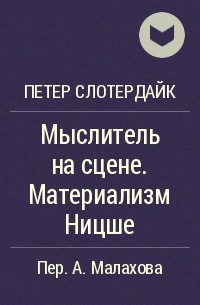
Петер Слотердайк — библиография
- 14 произведений
- 25 изданий на 6 языках
Произведения
-
Unter der Platane Петер СлотердайкРазвернуть
Peter Sloterdijk ist einer der wichtigsten zeitgen?ssischen Philosophen. Immer wieder hat er mit seinen Ideen ?ffentliche Diskussionen angeregt. Peter Trawny, der Sloterdijk schon als Student gelesen hat, besuchte den Philosophen im Mai 2019 in einem kleinen Dorf in S?dfrankreich. Das Ergebnis dieser Begegnung ist ein Gespr?ch unter anderem ?ber das Verh?ltnis von Philosophie und Biographie. Sloterdijk erl?utert pers?nliche Aspekte seines Denkens, die stets philosophische Bedeutung beanspruchen. An vielen Stellen h?rt der Leser das Echo einer einzigartigen Land- und Ortschaft; eine heiter-gelassene Stimmung, die ernste Themen nicht…
-
Stress and Freedom Петер СлотердайкРазвернуть
In this short book Peter Sloterdijk offers a genealogy of the concept of freedom from Ancient Greece to the present day. This genealogy is part of a broader theory of the large political body, according to which Sloterdijk argues that political communities arise in response to a form of anxiety or stress. Through a highly original reading of Rousseau's late Reveries of a Solitary Walker, Sloterdijk shows that, for Rousseau, the modern subject emerges as a subject free of all stress, unburdened by the cares of the world. Most of modern philosophy, and above all German Idealism, is an attempt to reign back Rousseau's useless and anarchical…
-
The Aesthetic Imperative Петер СлотердайкРазвернуть
In this wide-ranging book, renowned philosopher and cultural theorist Peter Sloterdijk examines art in all its rich and varied forms: from music to architecture, light to movement, and design to typography. Moving between the visible and the invisible, the audible and the inaudible, his analyses span the centuries, from ancient civilizations to contemporary Hollywood. With great verve and insight he considers the key issues that have faced thinkers from Aristotle to Adorno, looking at art in its relation to ethics, metaphysics, society, politics, anthropology and the subject. Sloterdijk explores a variety of topics, from the Greco-Roman…
-
Not Saved Петер СлотердайкРазвернуть
One can rightly say of Peter Sloterdijk that each of his essays and lectures is also an unwritten book. That is why the texts presented here, which sketch a philosophical physiognomy of Martin Heidegger, should also be characterized as a collected renunciation of exhaustiveness. In order to situate Heidegger's thought in the history of ideas and problems, Peter Sloterdijk approaches Heidegger's work with questions such as: If Western philosophy emerged from the spirit of the polis, what are we to make of the philosophical suitability of a man who never made a secret of his stubborn attachment to rural life? Is there a provincial truth of…
-
In The Shadow of Mount Sinai Петер СлотердайкРазвернуть
In this short book Peter Sloterdijk clarifies his views on religion and its role in pre-modern and modern societies. He begins by returning to the Mount Sinai episode in the Book of Exodus, where he identifies the emergence of what he calls the 'Sinai Schema'. At the core of monotheism is the logic of belonging to a community of confession, of being a true believer – this is what Sloterdijk calls the Sinai Schema. To be a member of a people means that you submit to the beliefs of the community just as you submit to its language. Monotheism is predicated on the logic of one God who demands your utmost loyalty. Hence at the core of monotheism…
-
El imperativo est?tico Петер СлотердайкРазвернуть
Un libro que perfectamente se puede considerar como el canon est?tico de Peter Sloterdijk. &t;br/&t; En el presente libro, Peter Sloterdijk toca todos los g?neros modernos de las artes, desde la m?sica hasta la arquitectura, desde el uso de la luz hasta las artes vivas, desde el dise?o hasta la tipograf?a. Transita por todos los campos de lo visible y lo invisible, de lo audible y lo inaudible, en un arco hist?rico que se extiende desde la Antig?edad hasta Hollywood. Cuando aplica su particular m?todo de distanciamiento del discurso a la contemplaci?n de obras y g?neros art?sticos, los objetos descritos se muestran s?bitamente bajo una…
-
You Must Change Your Life Петер СлотердайкРазвернуть
In his major investigation into the nature of humans, Peter Sloterdijk presents a critique of myth – the myth of the return of religion. For it is not religion that is returning; rather, there is something else quite profound that is taking on increasing significance in the present: the human as a practising, training being, one that creates itself through exercises and thereby transcends itself. Rainer Maria Rilke formulated the drive towards such self-training in the early twentieth century in the imperative 'You must change your life'. In making his case for the expansion of the practice zone for individuals and for society as a whole,…













